- Home
- Donald Hamilton
Texas Fever Page 15
Texas Fever Read online
Page 15
“I see your point,” Kincaid said wryly. “It would hardly inspire confidence in the local law. So you were going to handle it yourself, and take care of Will Reese into the bargain? Not to mention taking back your cattle?”
“Yes, sir. Actually, Will Reese came first in our reckoning. We didn’t know at the time that Keller would be taking the herd. We didn’t even know his real name, then, or what he was hanging around here for.”
“You were just going to take it back from whoever bought it, after settling with Will, is that it?”
“Yes, sir. We figured we had the right. Leastways, we’d have the guns, and the two seem to go together, in Indian Territory.”
“I see.” The sheriff looked grimly at Chuck. “Just what made you up and change your mind, son?”
Chuck hesitated. It was a hard question to answer. He could hardly say that he had somehow come to the realization that there was more to growing up than just learning what to do in bed with a woman, although that was certainly part of it.
He said, “Well, there didn’t seem to be any end to it, sir.”
“What do you mean?”
Chuck moved his shoulders in a kind of shrug. “Well, suppose I was to settle with Will Reese for killing the Old Man. Then I’d settle with this Keller for killing Dave. Then, to make a clean sweep, I ought to go back east and find the Yankee soldier who got my brother Jim at Gaines’ Mill, oughtn’t I? And maybe I ought to figure out who was responsible for Ma dying. . . .’’ He shrugged again. “You see what I mean? Do it right, and I’d have a lifetime job on my hands. It doesn’t mean I don’t want those fellows punished, but you’re paid for such work, sheriff, and I’ve got other things to do. As for the cattle, with this money you got us, we’ll come home in fair shape if not exactly rich, and there’s plenty more steers in Texas. Twelve hundred longhorns aren’t worth turning outlaw for, the way I see it.”
The sheriff said, “You understand, there’s nothing I could do about Will Reese, even if I wanted to. Think what you like about it, nobody’s ever going to prove in court that he wasn’t just an officer of the law doing his duty.”
Chuck said, after a moment, “If he can live with it, I reckon I can.”
“This other man, however . . . You’re sure he called himself Keller? Jack Keller?”
“Yes, sir.”
“The name is familiar to me, although he’s never operated in these parts before, to my knowledge. He’s one of those . . . well, there’s been a lot of politics riding with these border gangs, but public opinion is turning against them, now that they can no longer hide their crimes under even a thin cloak of patriotism. I don’t promise I can get Mr. Keller for a murder committed down in the Territory, but I think I can say with confidence that his marauding days are numbered.”
“That’s good enough for me,” Chuck said.
“It may be,” the sheriff said, “but will it be good enough for your men? They were mighty hot under the collar when they left town.”
“I’ll do my best,” Chuck said mildly, “to persuade them to my way of thinking, Sheriff.”
Kincaid looked at him hard for a moment, and nodded. “See that you do. Anything else on your mind?”
Chuck hesitated. He would have liked to unburden himself of certain memories concerning the girl who had killed herself, but not in the presence of Jean Kincaid. Anyway, there were some things a man didn’t talk about He’d have to work it out with his own conscience, somehow. There was, after all, no real crime involved; it was none of the sheriff’s business.
“No, sir,” he said. “That’s about it.”
“I’ll be on my way, then,” Kincaid said. He caught the question in Chuck’s look, and grinned briefly. “Don’t worry, son. I’m not neglecting Jack Keller, even if I seem to be riding off on other business. I’ve got a reason for wanting to be seen heading out of town peacefully. There’s all kinds of ways of getting into a house besides walking through the front door.”
He wheeled his pony and departed at a trot. Beside Chuck, Jean Kincaid picked up the reins.
“Where can I let you off, Mr. McAuliffe?”
“Right up there at the livery stable, if you don’t mind, ma’am,” Chuck said.
They rode the short distance in silence. She brought the buggy to a halt in front of the place. He started to climb out.
“Mr. McAuliffe.”
“Yes’m?”
“I . . . I’m glad you had the good sense to give up your crazy scheme.”
He stepped to the ground, and looked up at her, sitting there. “Crazy, ma’am?” he said. “I don’t know about that. There’ll be those who’ll say we’re crazy for riding home humbly without avenging our dead or collecting more than a fraction of the money we came all this way to get. I’ll probably hear something like that from my own crew.” He shrugged his shoulders. “They could even be right.”
Her eyes widened slightly, the way they did when she was getting angry. He was coming to know the expression well.
“How can murder and robbery be right?”
He grinned at her lazily, knowing the grin would annoy her further. “In these parts, it seems to depend on who gets murdered and robbed, ma’am. I wasn’t thinking much about right, anyway. It was just that, after a good look at Mister Keller, I didn’t figure I wanted to get into the same line of business. It would have been the same if he’d been a banker or barber.”
She glared at him, speechless, and shook the reins to send the buggy away, without saying good-bye. He stepped back, removing his hat politely, and watched her drive off, regretting a little that he’d succumbed to the temptation to make her mad. But apparently it wasn’t enough for a woman that you did a thing. To satisfy her, you had to wrap it up in a sanctimonious speech about right and wrong.
Well, it wasn’t as if Jean Kincaid’s opinion was a matter of great importance. After all, it was only last night that he’d asked another girl to marry him. To be sure, that girl was now dead, but respect for her memory alone should keep him from looking at other females for a decent interval—not that he’d be concerned about what a sharp-tongued Yankee miss thought of him, in any case.
CHAPTER 28
The pony was still a trifle lame from being knocked off its feet by Will Reese’s big gray, so Chuck took it easy, riding south from town. He reached the crew’s camp in the middle of the afternoon. It was located by a small spring in a pleasant grove of trees, with an open meadow for the horses close at hand.
He dismounted by the spring, splashed water on his face, drank sparingly, and straightened up to untie the heavy bundle lashed to his saddle. He passed this to Joe Paris, who had come up to greet him.
“There are your weapons,” he said. “I’ve arranged for provisions at the store; Coosie can pick them up with the wagon. He’d better hitch up right now or he won’t be back before midnight. Everything’s paid for; all he has to do is load up and come right back.”
He swung back to attend to his mount, limping slightly. Joe Paris asked, behind him: “What happened to you, kid? You didn’t have that cut lip when we saw you last, and you move like a couple more horses had run over you.”
“Why,” Chuck said without turning his head, “I got licked, I reckon. Anyway, when it was over, I was down and the other fellow was up.”
“That big deputy again?”
Chuck nodded, hooking the stirrup over the saddle horn so he could get at the cinches. He was aware that the rest of the crew had gathered around. They’d be eager for action after a day’s inactivity. They’d expect unhesitating leadership from him, after his violent words at his father’s grave. It occurred to him that, lately, he. seemed to be forever tripping over the consequences of having talked too much and too loudly. Maybe it would be a good idea if he practiced keeping his mouth shut now and then.
“What happened?” Paris asked.
“Sheriff Kincaid stopped the fight, if you want to call it a fight,” Chuck said shortly. He glanced around. “Where’s Mik
e?”
“He’s trailing the herd,” Joe said. “We’ve been kind of keeping an eye on things, waiting for you. One of the boys even slipped over to watch the auction. That Netherton fellow was there, calling himself Bristow.”
“His real name is Jack Keller,” Chuck said.
“Well, whatever his name is, that Yankee sheriff got him to pay three dollars a head for those steers. Did the sheriff pass any of it along to you, or did he keep it all for himself?”
Chuck patted his saddlebag. “I’ve got it all here, except for the fine and what I paid out for supplies. The sheriff’s all right.”
Joe Paris laughed. “I declare, we’re likely to come out of this in pretty good shape, after all. We’ll take those cattle back, like you said, sneak them up to the railroad somehow—they can’t be watching the whole Kansas border—and get a good price for them there to add to Mr. Keller’s money. We’ll be fixed to buy all of Texas, time we get home.” He chuckled. “Damn, if that won’t be a joke on the Yankees, selling them the same cattle twice.”
Chuck asked, “How many men has Keller got riding with him?”
“Just an average crew, six or eight hands and that deputy sheriff, last I heard.”
“He had more than that down at the Arkansas. The rest must be hiding out somewhere so as not to arouse suspicion.”
“Well, we licked them once, we can lick ’em again,” Joe said. “I must say, I’m mighty pleased at the way it’s worked out. I wasn’t looking forward to jumping a bunch of honest cattlemen, Yankees or no; but I don’t figure to spend many sleepless nights over what happens to this Keller and his friends. They’re long overdue, the way I see it.”
Chuck stripped the saddle and blanket from his pony, frowning. He was stalling and he knew it; and the longer he waited, the harder it would get.
Joe Paris said cheerfully, “I’ve got to hand it to you, youngster. The deputy went right along with them, just like you figured he would. Better throw that saddle on a horse that isn’t lame. Mike’s going to let us know as soon as Reese starts back to town. You’ll get a chance to pay him back for those bruises, with a gun in your hand.” The foreman hesitated, and went on: “I’ve been thinking over what you said at the Major’s grave,, and you’re right about the way to do it. A backshooting murderer like that doesn’t deserve an even break. We’ll just finish him off like any coyote, and go after the herd.” There was a little pause. Chuck, still holding his saddle, swung about to face them. “We’re not finishing anybody off,” he said.
Joe Paris frowned quickly. “But—”
“And we’re not stealing any cattle,” Chuck said deliberately. “We’re spending the night right here while the cook fetches our grub and ammunition from town— Coosie, you’d better start hitching up—and in the morning we’re saddling up and heading for home.”
He kept his gaze on Joe, because the foreman was the one to convince, but he was aware that his words weren’t being received with favor by the other men. There was a little stir of disapproval throughout the group.
Paris said quickly, “It was your own idea, kid—”
“That’s right,” Chuck admitted. “I’d just buried my pa and I wasn’t feeling too happy about it; and I guess I shot off my mouth some about the big mean things I was going to do. But I’ve had a day to simmer down, and I’m taking back what I said. We’re not going to turn murderers and outlaws just because we’ve run into a little bad luck. The sheriff’s an honest man, and he has all the information I could give him. He’ll settle with Mister Keller; apparently the law’s been after that hombre for a long time. As for Reese, I don’t love him any more than I ever did, but he was within his legal rights when he used his gun, and drygulching him isn’t going to bring the Old Man back. The Old Man wouldn’t even like it if he knew about it.”
Joe said quickly, “All right, then we’ll take him in the open! But I’m not leaving here with the Major’s killer alive!”
Chuck said, “We’re heading back to Texas, old-timer. Coosie, damn you, I told you to start getting that wagon ready!”
There was a brief silence. He could feel them all against him. The cook, burly and bald, had recovered his bullying assurance in the weeks that had passed since he’d had to seek shelter in the muddy Arkansas. He stepped forward heavily and said, “Don’t you swear at me, young fellow! I wouldn’t have taken it from your daddy, and I sure ain’t taking it from you! If you ask me, you’re getting a mite too big for your britches, telling grown men what to—” Chuck swung the saddle, with a mighty two-handed effort. It caught the larger man alongside the head. The cook staggered. The spring was behind him. Too late, he felt the drop-off and tried to catch himself, arms flailing; then he sat down in twelve inches of water with a resounding splash. His discomfiture brought a ripple of involuntary laughter from men who’d had to put up with his greasy cooking and surly ways. Chuck wheeled to face them.
“This is a McAuliffe outfit,” he said, breathing hard, “and my name’s McAuliffe. Now, you can ride south with me in the morning, or I’ll pay you off right here, but one thing’s for sure: any murdering you do, you do on your own time! All right, Joe, which is it to be?”
Joe Paris glanced at the cook, who was hauling himself out of the spring, snorting and dripping. Paris chuckled and the remaining tension went out of the group.
“You’ve got mighty convincing ways, Mr. McAuliffe,” he said. “Just take it easy with that saddle; I’m an old man and I’ve had my bath for this year. Another would likely kill me.”
They were all grinning now. Chuck filled his lungs with air. “We ride for Texas?”
Paris laughed. “The Major always said you’d be hard to handle if you ever started feeling your oats. Watch that Chuck boy of mine, he’d say; the kid ain’t much for big but he’s hell for smart. All right, amigo. He was your dad. I reckon you’ve got the right to say—”
There was a crackle of sound at the edge of the grove. Joe stopped speaking. All the men instinctively moved nearer the weapons that had been deposited on the ground at the foreman’s feet.
“Rider coming in,” somebody said.
They caught a glimpse of movement, and Joe said, “Hell, it’s Mike’s buckskin. . . . that’s funny! Why’s Mike spooking around like that! Why doesn’t he ride right in?”
Then the buckskin horse came slowly into full sight, and they saw that it carried no rider. The bridle-reins were twisted about the saddle horn. Even before the animal reached them, they could see the blood on the saddle.
CHAPTER 29
Waiting on the ridge, in the fading light, Chuck felt the bitterness of a man whose good resolutions had been nullified by a malicious fate. If Joe Paris had just minded his business and hadn’t sent Miguel . . . Chuck grimaced. If he, Chuck, had just kept quiet instead of blowing off like a windy fool, Joe might never have thought of shadowing the herd with the idea of later reclaiming it by force, and Mike wouldn’t be in trouble or dead. Fate made a handy excuse, but there generally wasn’t much substance to it, when you looked at it hard.
Below him, he could see Keller’s camp, a couple of miles distant, out in the open in a long, shallow, grassy valley. Off to the right, where the valley narrowed, was the herd with a couple of riders on guard. It was a calm and peaceful scene, and instinct warned him that it was false as a harlot’s smile—he’d heard the simile used once as a boy, and he remembered asking his mother what a harlot was. She’d been quite taken aback, he recalled; and then she’d said that a harlot was a very bad woman. There were two kinds of women, she’d said, good and bad, and she hoped he’d grow up having nothing to do with the bad.
His brother Dave, on the other hand, had * thought he needed education; and now he had a pretty good idea what kind of education Dave had had in mind. There seemed to be two viewpoints in this matter, the male and the female; and trying to reconcile them didn’t look promising. It seemed to be a matter, like so many others, in which a man—as long as his loyalty was not committed elsewher
e—could do what seemed necessary, or even just what seemed desirable, as long as he refrained from talking about it afterwards.
“Pssst!” It was Joe Paris, below and behind him. “Sam’s back. Come on down.”
He eased himself back from the skyline cautiously, before he stood up and hurried down to where the foreman was standing. Sam Biederman was there, too. The big, blond rider had a worn and sweaty look. The rest of the crew was lounging nearby.
“See anything from up there?” Joe asked.
Chuck shook his head. “Never saw a cow camp look so innocent.”
“They’ve got Mike. He’s alive,” Joe said. “Tell him, Sam.”
“I worked in close,” Biederman said. “They have no guards near the camp, no sentries. But Miguel they have, hanging by the wrists from the wagon tongue, propped high. That man with the fine beard, he should an Apache be. Little cuts with a knife he makes, here, there, and he laughs, haha. Then Mike spits, ptuie, and the bearded one strikes with the fist so that Mike hangs there without life. They were trying to revive him with water when I came away.”
There was a murmur from the men. Chuck asked, “Could you hear what Keller wanted?”
“I was not close enough. Questions he asked, but he got no answer from Miguel.”
Joe Paris said, “I had him tagged for a mean one at first, with that scar on his face. But now I find I’ve got to get him out of there.”
“To be sure,” Chuck said, “but it will take doing.”
“I have an idea,” the foreman said. “If we circle around to the west end of the valley, we’ll have the herd between us and the camp. We can get those steers to running, and send them right through the camp, and follow them in. The wagon will give Miguel some protection.

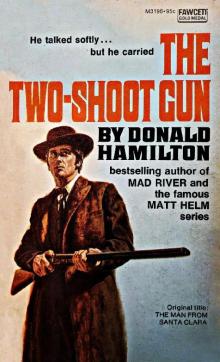 The Two-Shoot Gun
The Two-Shoot Gun Mad River
Mad River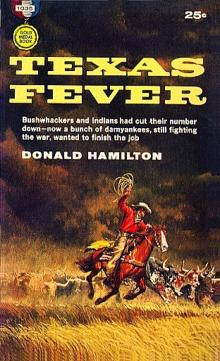 Texas Fever
Texas Fever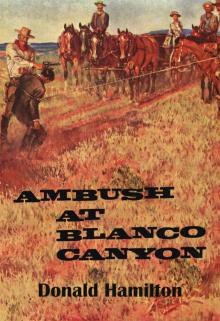 Ambush at Blanco Canyon
Ambush at Blanco Canyon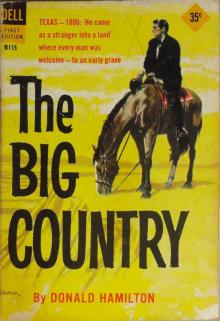 The Big Country
The Big Country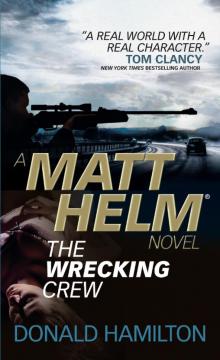 The Wrecking Crew
The Wrecking Crew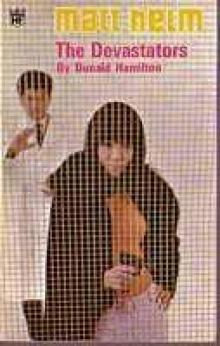 The Devastators mh-9
The Devastators mh-9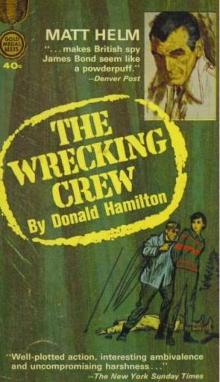 The Wrecking Crew mh-2
The Wrecking Crew mh-2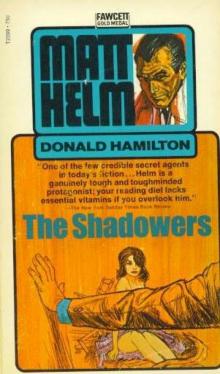 The Shadowers mh-7
The Shadowers mh-7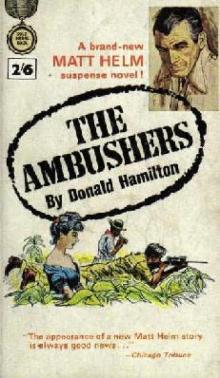 The Ambushers mh-6
The Ambushers mh-6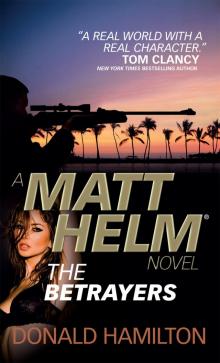 The Betrayers
The Betrayers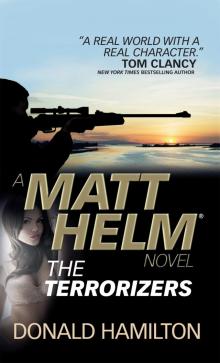 The Terrorizers
The Terrorizers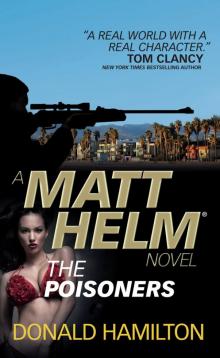 The Poisoners
The Poisoners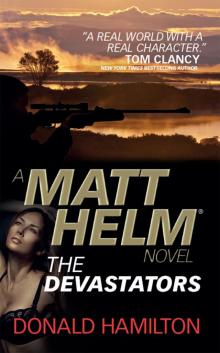 The Devastators
The Devastators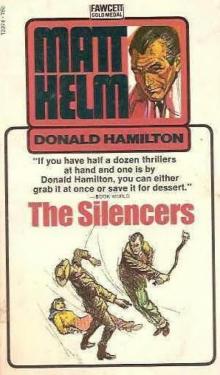 The Silencers mh-5
The Silencers mh-5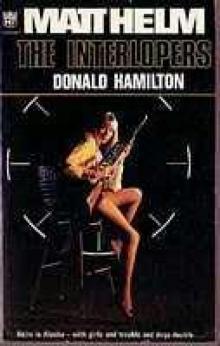 The Interlopers mh-12
The Interlopers mh-12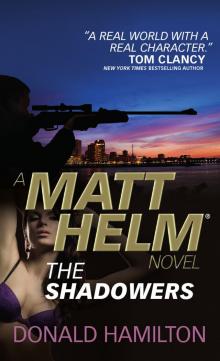 The Shadowers
The Shadowers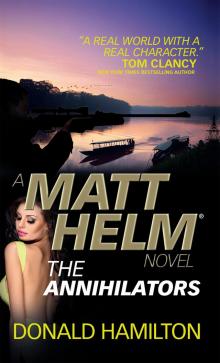 The Annihilators
The Annihilators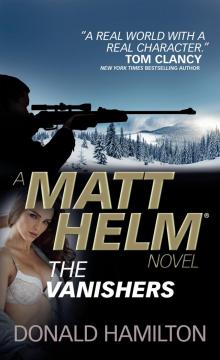 The Vanishers
The Vanishers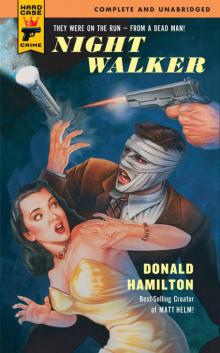 Night Walker
Night Walker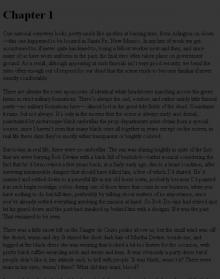 The Revengers
The Revengers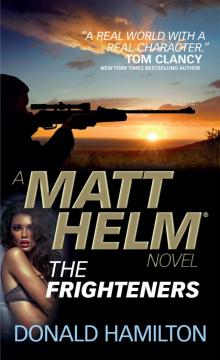 The Frighteners
The Frighteners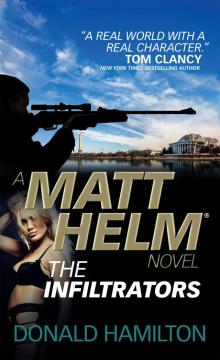 The Infiltrators
The Infiltrators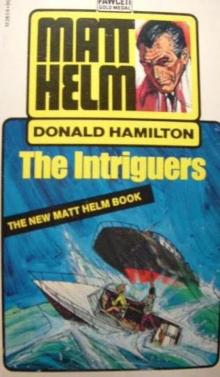 The Intriguers mh-14
The Intriguers mh-14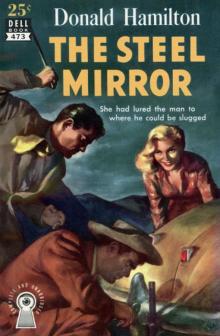 The Steel Mirror
The Steel Mirror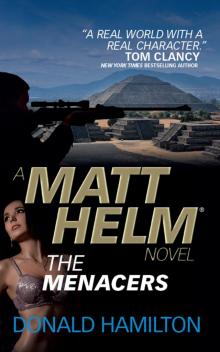 The Menacers
The Menacers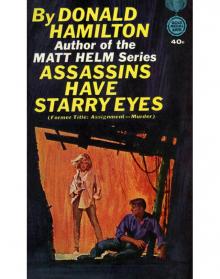 Assassins Have Starry Eyes
Assassins Have Starry Eyes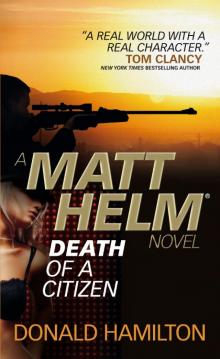 Death of a Citizen
Death of a Citizen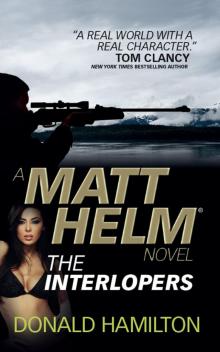 Matt Helm--The Interlopers
Matt Helm--The Interlopers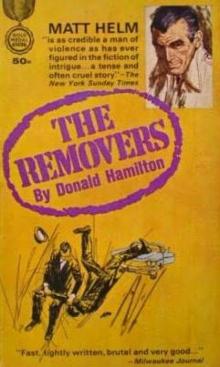 The Removers mh-3
The Removers mh-3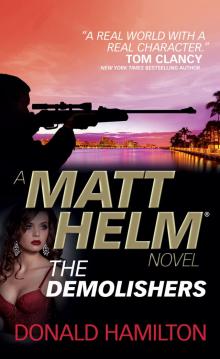 The Demolishers
The Demolishers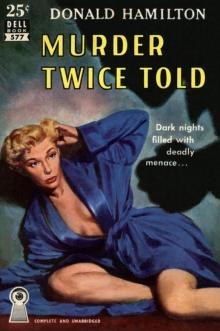 Murder Twice Told
Murder Twice Told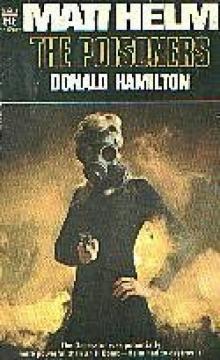 The Poisoners mh-13
The Poisoners mh-13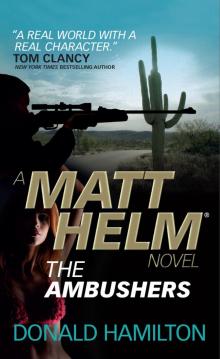 The Ambushers
The Ambushers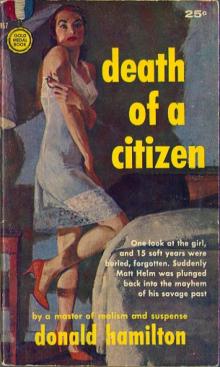 Death of a Citizen mh-1
Death of a Citizen mh-1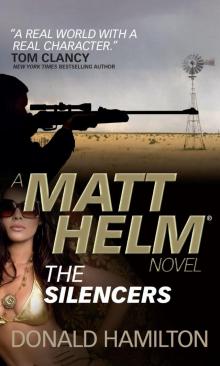 The Silencers
The Silencers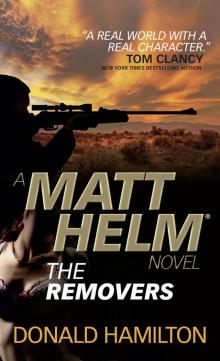 The Removers
The Removers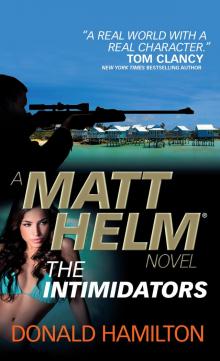 The Intimidators
The Intimidators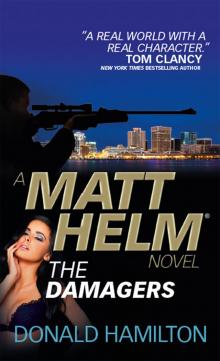 The Damagers
The Damagers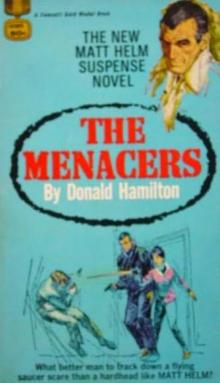 The Menacers mh-11
The Menacers mh-11 The Retaliators
The Retaliators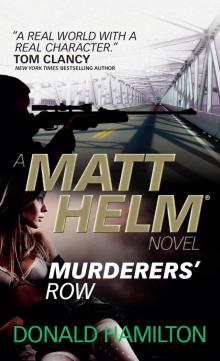 Murderers' Row
Murderers' Row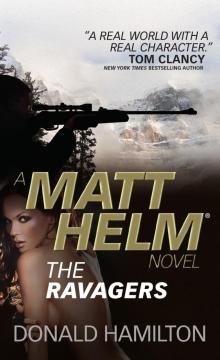 The Ravagers
The Ravagers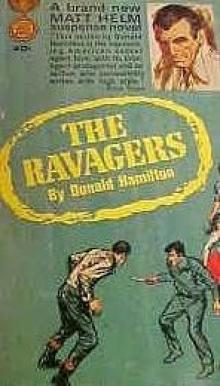 The Ravagers mh-8
The Ravagers mh-8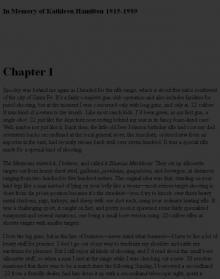 The Threateners
The Threateners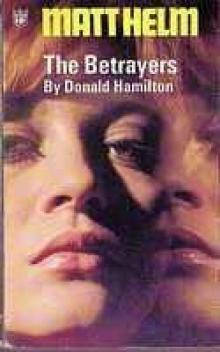 The Betrayers mh-10
The Betrayers mh-10